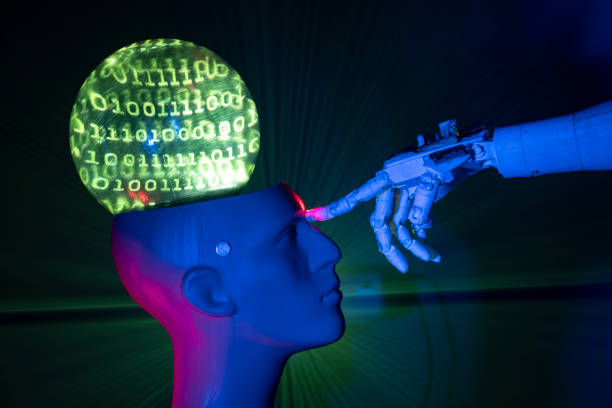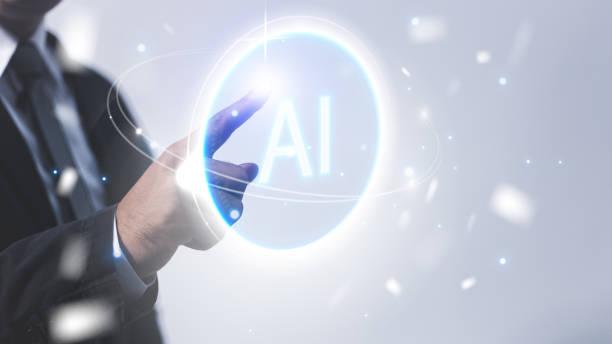What is an Artificial Intelligence Robot and How Does It Work?
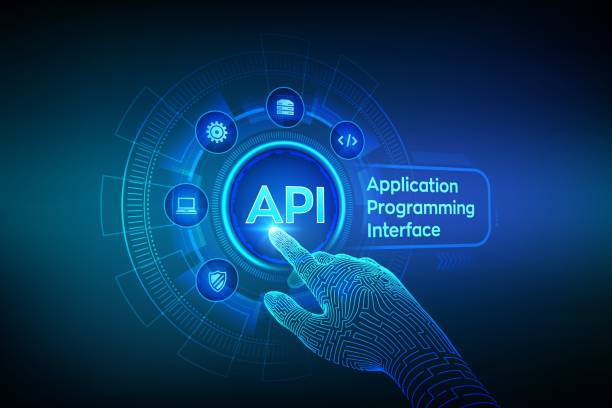
An artificial intelligence robot is a combination of two important fields: #robotics and #artificial_intelligence.
Robotics deals with the design, construction, and operation of robots, while artificial intelligence deals with the development of systems capable of performing tasks that typically require human intelligence.
When these two fields are combined, the result is a robot that is capable of learning, reasoning, problem-solving, and decision-making.
These robots use complex algorithms and neural networks to process information and perform tasks.
Artificial intelligence allows the robot to learn from data and improve its performance.
Therefore, an artificial intelligence robot is not only capable of performing programmed tasks, but it can also adapt to new situations and operate independently.
These abilities make artificial intelligence robots applicable in various industries, including manufacturing, healthcare, and transportation.
One of the main features of these robots is the ability to interact with the environment and people, which is made possible through sensors and natural language processing algorithms.
Are you tired of your online store having visitors but no sales? Rasaweb solves your main problem by designing professional online stores!
✅ Significant increase in sales with targeted design
✅ Flawless user experience for your customers
⚡ Get free consultation!
Key Applications of Artificial Intelligence Robots in Today’s World
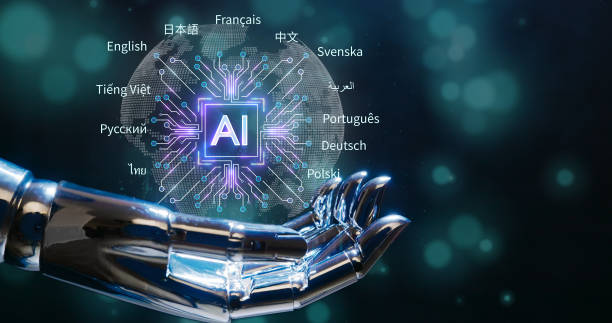
Artificial intelligence robots are currently used in many industries and fields.
In the manufacturing industry, these robots are used for automating production lines, quality control, and material handling.
In healthcare, artificial intelligence robots can assist doctors in precise surgeries, patient care, and disease diagnosis.
In the transportation industry, self-driving robots and intelligent traffic management systems are among the applications of this technology.
In addition, artificial intelligence robots play an important role in customer service, education, and even in household chores.
For example, chatbot robots can answer customer questions and solve their problems.
Educational robots can help students learn different concepts.
And household robots can perform tasks such as cleaning and caring for the elderly.
These applications show that artificial intelligence robots have high potential for improving the quality of life and increasing productivity in various industries.
With the advancement of technology, it is expected that the applications of artificial intelligence robots will become more widespread and diverse in the future.
Advantages and Disadvantages of Using Artificial Intelligence Robots
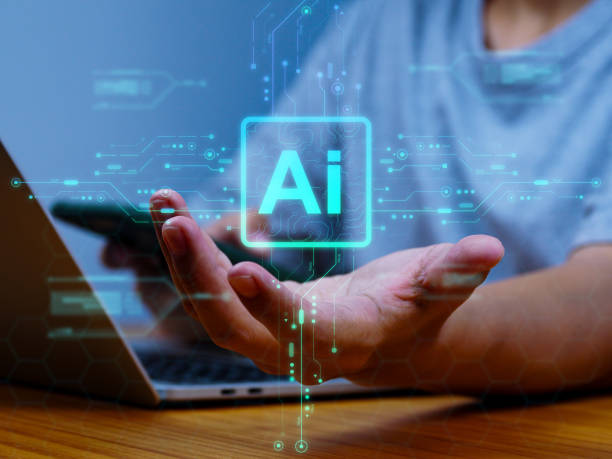
The use of artificial intelligence robots has numerous advantages and disadvantages that should be carefully considered.
Among the advantages of this technology are increased productivity, reduced costs, improved accuracy, and increased safety.
Artificial intelligence robots can work continuously and without fatigue, which leads to increased production and reduced labor costs.
Also, these robots can perform tasks that are dangerous or difficult for humans, such as working in hazardous environments or performing complex surgeries.
However, the use of artificial intelligence robots also has disadvantages.
These disadvantages include job losses, high initial costs, and ethical issues.
Automation of many tasks can lead to widespread unemployment.
Also, the development and implementation of artificial intelligence robots require significant investment.
In addition, ethical issues related to privacy, accountability, and discrimination are among the important challenges that need to be considered.
Ultimately, the decision to use artificial intelligence robots should be made with consideration of all the advantages and disadvantages.
| Advantages | Disadvantages |
|---|---|
| Increased Productivity | Job Loss |
| Reduced Costs | High Initial Costs |
| Improved Accuracy | Ethical Issues |
Ethical and Legal Challenges of Using Artificial Intelligence Robots
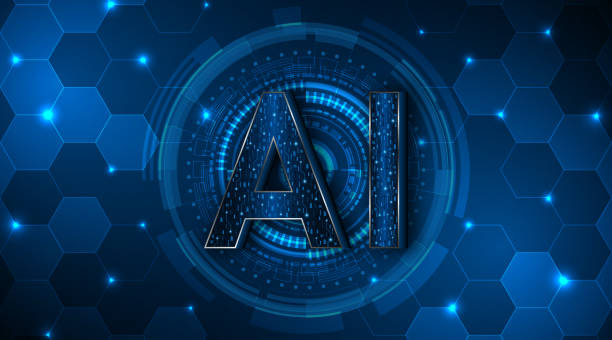
The use of artificial intelligence robots poses several ethical and legal challenges.
One of the most important of these challenges is the issue of accountability.
If an artificial intelligence robot causes damage, who will be responsible? Should the robot’s manufacturer, the robot’s owner, or the robot itself be held accountable? These questions do not yet have definitive answers and require the development of new laws and regulations.
Another challenge is the issue of privacy.
Artificial intelligence robots typically collect and process large amounts of data, which can lead to violations of individuals’ privacy.
Therefore, it is necessary to establish laws and regulations to protect individuals’ data and privacy.
In addition, the issue of discrimination is another important challenge.
Artificial intelligence algorithms may unintentionally be discriminatory and make decisions that are detrimental to certain groups of people.
To prevent this, algorithms need to be carefully reviewed and trained using diverse and non-discriminatory data.
Finally, it is necessary for all stakeholders, including governments, companies, and civil society, to participate in the development of laws and regulations related to artificial intelligence robots to ensure that this technology is used for the benefit of all.
Are you tired of your company’s website not meeting your expectations? With Rasaweb, design a professional website that showcases the true face of your business.
✅ Increased attraction of new customers and sales leads
✅ Increased credibility and trust in your brand among your audience
⚡ Get a free website design consultation!
What Will Be the Future of Artificial Intelligence Robots?
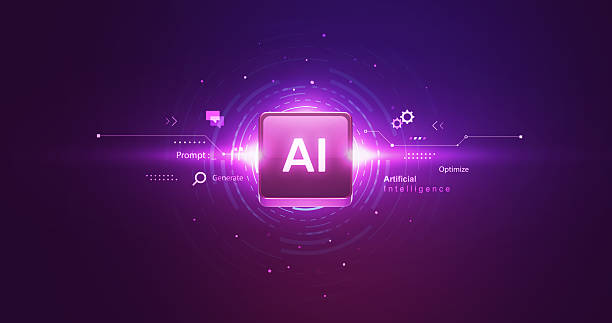
The future of artificial intelligence robots is very bright and full of potential.
With the advancement of technology, it is expected that artificial intelligence robots will be able to perform more complex and diverse tasks.
These robots can play an important role in various fields, including medicine, education, transportation, and manufacturing.
In medicine, artificial intelligence robots can assist doctors in diagnosing diseases, performing precise surgeries, and providing personalized care to patients.
In education, educational robots can help students learn different concepts and provide immediate feedback.
In transportation, self-driving robots can improve the safety and efficiency of transportation.
And in manufacturing, artificial intelligence robots can automate production lines and increase product quality.
In addition, it is expected that artificial intelligence robots will be able to interact more naturally and intelligently with humans in the future.
These robots can understand human emotions and respond to them appropriately.
Ultimately, artificial intelligence robots have high potential for improving the quality of life and solving global problems.
However, it is necessary to manage this technology carefully to prevent ethical and legal problems.
Types of Artificial Intelligence Robots and Their Features
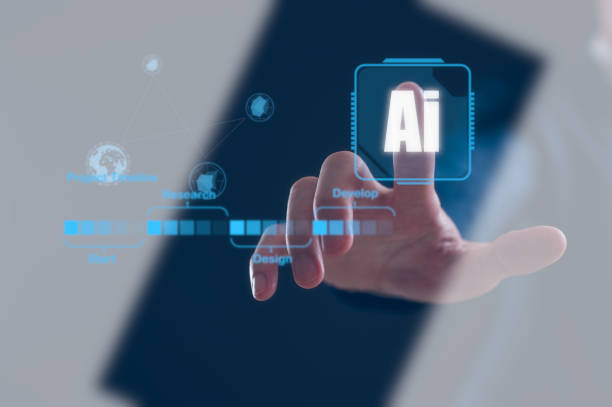
Artificial intelligence robots can be categorized based on various criteria, including the type of application, the level of autonomy, and the type of artificial intelligence used.
Based on the type of application, robots can be divided into industrial robots, service robots, medical robots, and military robots.
Industrial robots are used for automating production lines and performing repetitive tasks.
Service robots are used to provide services to customers, such as chatbot robots and cleaning robots.
Medical robots are used to assist doctors in diagnosing diseases and performing surgeries.
And military robots are used to perform military tasks, such as reconnaissance robots and fighter robots.
Based on the level of autonomy, robots can be divided into remote-controlled robots, semi-autonomous robots, and fully autonomous robots.
Remote-controlled robots are controlled by humans.
Semi-autonomous robots can perform some tasks independently, but require human supervision.
And fully autonomous robots can perform all tasks independently and without the need for human supervision.
Based on the type of artificial intelligence used, robots can be divided into machine learning-based robots, expert system-based robots, and neural network-based robots.
Machine learning-based robots use machine learning algorithms to learn from data and improve their performance.
Expert system-based robots use specialized knowledge to solve problems.
And neural network-based robots use neural networks to process information and perform tasks.
The Current Status and Prospects of Artificial Intelligence Robots in Iran
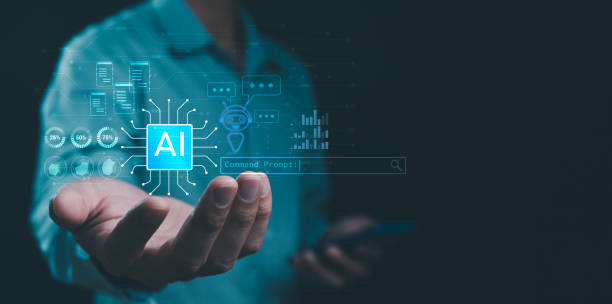
In Iran, the field of robotics and artificial intelligence is developing, and efforts have been made to localize these technologies.
Several universities and research centers are active in this field and various projects are underway.
However, there are still challenges that need to be overcome.
These challenges include lack of investment, shortage of skilled labor, and lack of appropriate infrastructure.
Despite these challenges, there is high potential for the development of artificial intelligence robots in Iran.
Iran has a young and talented workforce that can play an important role in this field.
Also, Iran has rich natural resources that can be used for the development of artificial intelligence robots.
To develop this field, it is necessary for the government and the private sector to work together to make the necessary investments, provide appropriate infrastructure, and train the required skilled labor.
By taking these measures, Iran can become one of the leading countries in the field of artificial intelligence robots in the near future.
The use of artificial intelligence robots in various industries of the country can help increase productivity and competitiveness.
| Challenges | Solutions |
|---|---|
| Lack of Investment | Attracting Domestic and Foreign Investment |
| Shortage of Skilled Labor | Developing Specialized Training |
| Lack of Appropriate Infrastructure | Creating the Necessary Infrastructure |
Artificial Intelligence Robots and Their Impact on the Job Market

Artificial intelligence robots will have a significant impact on the job market.
On the one hand, the automation of many tasks can lead to job losses.
In particular, jobs that require low skills and are repetitive are at greater risk.
On the other hand, artificial intelligence robots can also create new job opportunities.
For example, jobs in the design, construction, maintenance, and programming of artificial intelligence robots will be created.
In addition, artificial intelligence robots can help increase productivity and economic growth, which can lead to the creation of new jobs in other industries.
To address the challenges arising from automation, it is necessary for governments and companies to provide training and retraining programs for workers so that they can acquire the skills needed for new jobs.
Also, it is necessary to provide support policies for workers who lose their jobs.
Ultimately, artificial intelligence robots can help improve working conditions and increase job satisfaction.
Robots can perform difficult and dangerous tasks, which can lead to reduced stress and increased safety for workers.
Artificial intelligence robots are a powerful technology that can help improve life and work.
Are you disappointed with the low conversion rate of your online store?
Rasaweb’s professional online store design is your definitive solution!
✅ Increase your sales and revenue
✅ Unparalleled user experience for your customers
⚡ Get a free consultation now!
The Difference Between Traditional Robots and Artificial Intelligence Robots
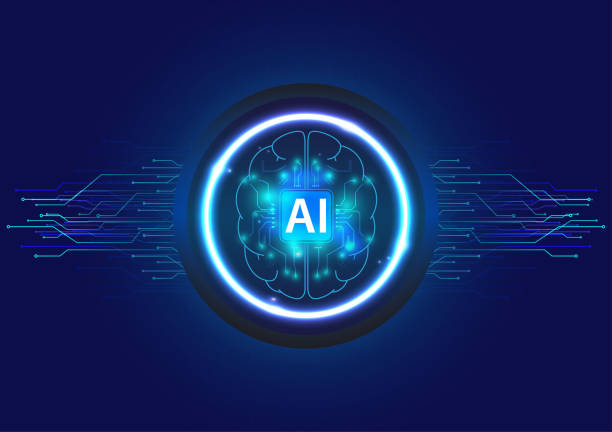
The main difference between traditional robots and artificial intelligence robots is their level of intelligence and autonomy.
Traditional robots are usually pre-programmed to perform specific tasks and are unable to learn or adapt to new situations.
These robots are usually used in controlled and repetitive environments, such as production lines.
In contrast, artificial intelligence robots are capable of learning from data, reasoning, problem-solving, and decision-making.
These robots can adapt to new situations and perform more complex tasks.
Artificial intelligence robots usually use complex algorithms and neural networks to process information and perform tasks.
These robots can operate in unpredictable and dynamic environments, such as hospitals and cities.
In short, traditional robots are tools that perform pre-defined tasks, while artificial intelligence robots are intelligent systems that are capable of learning and decision-making.
Artificial intelligence robots are a new generation of robots that have high potential for changing life and work.
How Can Artificial Intelligence Robots Help Improve People’s Lives?
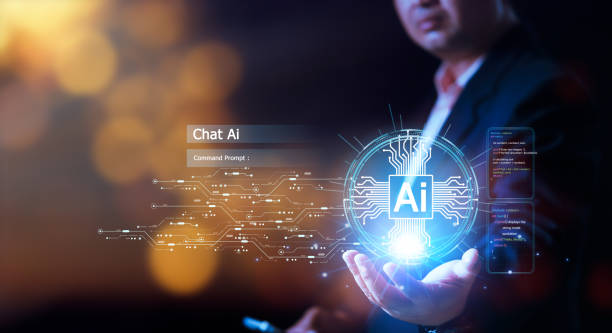
Artificial intelligence robots can help improve people’s lives in various ways.
These robots can perform hard, dangerous, and repetitive tasks, which can lead to reduced stress and increased safety for individuals.
Artificial intelligence robots can assist people in performing daily tasks, such as cleaning, shopping, and caring for the elderly and children.
These robots can help people learn new skills and access information.
Artificial intelligence robots can help people improve their health, such as diagnosing diseases, providing personalized care, and assisting people with disabilities.
For example, rehabilitation robots can help people with disabilities perform daily activities.
Nursing robots can help the elderly care for themselves.
And medical robots can help doctors diagnose diseases and perform surgeries.
Ultimately, artificial intelligence robots have high potential for improving the quality of life and increasing the well-being of individuals.
Responsible development and use of this technology can help build a better world.
The use of #artificial_intelligence in robots not only increases efficiency, but also allows artificial intelligence robots to operate independently in different situations.
Frequently Asked Questions
| Row | Question | Answer |
|---|---|---|
| 1 | What is an Artificial Intelligence Robot? | An artificial intelligence robot is a machine capable of understanding, reasoning, learning, and problem-solving, and can perform complex tasks with relative autonomy. |
| 2 | What are the most important applications of artificial intelligence robots? | The main applications include industrial manufacturing, customer service (chatbots), medicine and surgery, self-driving transportation, space exploration, and military affairs. |
| 3 | What is the main difference between an artificial intelligence robot and a regular robot? | A regular robot only follows programmed instructions, while an artificial intelligence robot can learn from data, make decisions, and adapt to new environments. |
| 4 | How do artificial intelligence robots learn? | They learn through machine learning algorithms (such as deep learning, reinforcement learning) and processing vast amounts of data, identifying patterns, and improving their performance. |
| 5 | Can artificial intelligence robots have emotions? | Currently, artificial intelligence robots do not have real emotions in the human sense. They can mimic or recognize emotions, but they do not understand or experience them. |
| 6 | What are the current limitations of artificial intelligence robots? | Limitations include the need for large amounts of data, the inability to understand abstract concepts, the lack of real creativity, ethical issues, and challenges in generalization in new environments. |
| 7 | What is the role of artificial intelligence in the development of humanoid robots? | Artificial intelligence helps humanoid robots to walk, maintain balance, understand their surroundings, interact with humans, and perform complex tasks. |
| 8 | How is the future of artificial intelligence robots predicted? | It is predicted that artificial intelligence robots will become smarter, more autonomous, and capable of performing more complex tasks in everyday life and industry, and their interaction with humans will increase. |
| 9 | Can artificial intelligence robots replace all human jobs? | It is unlikely that all human jobs will be replaced. Robots will take over many repetitive and dangerous tasks, but jobs that require creativity, empathy, and ethical judgment will remain. |
| 10 | What ethical and social challenges arise with the expansion of artificial intelligence robots? | Challenges include issues related to privacy, data security, ethical decision-making by robots, impact on employment, and accountability in the event of errors. |
And other services of Rasa Web advertising agency in the field of advertising
Smart Google Ads: Transform campaign management with the help of SEO-driven content strategy.
Smart Advertising Campaign: A creative platform to improve customer acquisition with Google Ads management.
Smart Data Analysis: An exclusive service to increase click-through rates based on marketing automation.
Smart Brand Identity: A fast and efficient solution for attracting customers with a focus on custom programming.
Smart Digital Branding: An effective tool for digital branding with the help of custom programming.
And more than hundreds of other services in the field of internet advertising, advertising consulting and organizational solutions
Internet Advertising | Advertising Strategy | Advertorial
Resources
Smart Robots A Future for Building a Better Life
,What is Artificial Intelligence (AI)? – Concepts, Applications and Types
,Artificial Intelligence – Wikipedia, the free encyclopedia
,A look at the future of artificial intelligence; Opportunities and threats ahead of humanity
? Are you ready to transform your business in the digital world? Rasaweb Aferin, a leading agency in digital marketing services, is by your side with years of experience and expertise to turn your online dreams into reality. By providing innovative solutions in modern user interface website design, SEO, social media management and targeted advertising campaigns, we create a powerful and effective presence for your brand in the digital space.
Relying on up-to-date knowledge and a data-driven approach, we help you properly attract your target audience and maximize your conversion rate. From initial consultation to complete project implementation, Rasaweb Aferin’s expert team will be by your side step by step to experience results beyond your expectations.
For a free consultation and to learn more about our services that guarantee the future of your business, contact us today and start your digital success journey.
📍 Tehran, Mirdamad Street, next to Central Bank, South Kazerun Alley, Ramin Alley No. 6

